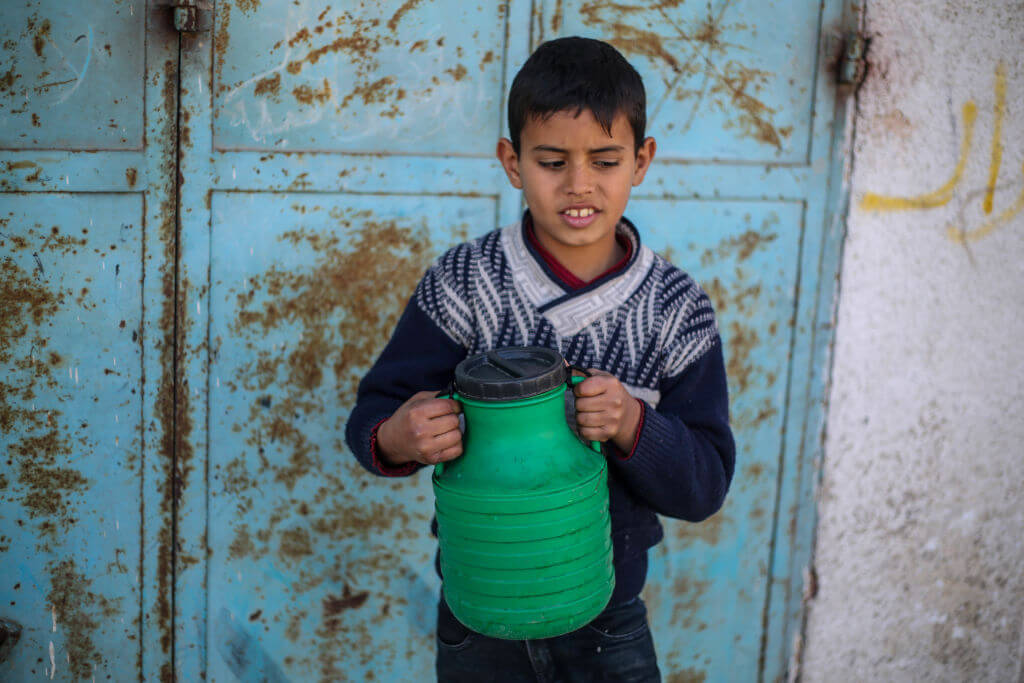Israel commiting acts of genocide by intentionally depriving Gazans of water, says new Human Rights Watch report
One critic called the report ‘propaganda in the disguise of research’

A Palestinian child collects water Feb. 29 in Gaza. Photo by Getty Images
Human Rights Watch issued a lengthy report Thursday documenting Israeli restrictions on water in Gaza since the war began on Oct. 7, 2023, arguing that they constitute acts of genocide and crimes against humanity.
“Water is essential for human life, yet for over a year the Israeli government has deliberately denied Palestinians in Gaza the bare minimum they need to survive,” Tirana Hassan, HRW’s executive director, said in a statement. “This isn’t just negligence; it is a calculated policy of deprivation that has led to the deaths of thousands from dehydration and disease.”
The group’s 184-page investigation was based on interviews with more than 100 people — including Palestinian residents of Gaza, health care professionals, water utility workers and staff members of aid organizations — as well as analysis of satellite imagery and data from humanitarian agencies gathered between October 2023 and September 2024. Human Rights Watch says most of Gaza’s 2 million residents lacked access to drinkable water for months, leading to widespread disease.
The Coordinator of Government Activities in the Territories, the Israeli agency that handles things like water in Gaza and the occupied West Bank, disputed the report’s conclusions and said Israel was doing what it could to keep the water flowing. The agency said that Israel has worked with aid groups to bring in 45,695 tons of water during the war, opened three water pipelines from Israel into Gaza and helped establish two from Egypt, and is working to repair broken water infrastructure in Gaza.
“This is being done despite Hamas’ ongoing efforts to exploit humanitarian initiatives for terrorist purposes,” the agency said in a statement. “Israel remains committed to continuing its significant efforts, in cooperation with the international community, to allow and facilitate access to water for Gaza’s civilian population.”
A damaged water supply
The majority of Gaza residents have had access to between 2 and 9 liters of water per day during the war, according to a July United Nations report cited by HRW, down from an average of 83 liters per day before it began. The report notes that The Sphere Project, which is often referenced by humanitarian aid organizations, has determined that basic water use for drinking, cooking and personal hygiene is 7.5 to 15 liters per person per day.
The report says that water production in Gaza between October 2023 and mid-February 2024 was 5.7% of its pre-war levels, again citing U.N. data. It also quotes from a July Oxfam report that said about 80% of water produced in Gaza was “lost in leakages due to damage to the water network during the hostilities.”
Israel and its supporters have dismissed these allegations, placing blame for civilian deaths on Hamas because it embeds fighters in densely populated areas, and saying it is the terror group that has diverted humanitarian aid for its own purposes. The Gaza health ministry has put the death toll since Oct. 7 above 45,000; Israeli officials say they have killed at least 17,000 Hamas militants.
HRW’s report comes two weeks after Amnesty International issued a report finding that Israel is committing genocide in Gaza. South Africa currently has a case in front of the International Court of Justice making a similar claim. Ireland is one of more than a dozen countries supporting that case, which led Israel to close its embassy in Dublin this week.
Proving intentionality
Human Rights Watch contends that the restrictions on water and damage done to the infrastructure to deliver it are not just byproducts of Israel’s military campaign, but an intentional campaign to deprive Gaza residents of basic needs, a requirement for the crime of genocide under international law. It bases this largely on a review of Israeli officials’ public statements.
For example, the report quotes Yoav Gallant, then Israel’s defense minister, promising in the immediate aftermath of the Hamas attack a “complete siege” on Gaza, cutting off electricity, fuel, and food supplies. Ten months later, in August, Bezalel Smotrich, Israel’s far-right finance minister, said it may be “justified and moral” to starve civilians in Gaza, the report notes.
In a statement accompanying the report, Hassan, the HRW director, called on governments that supply arms to Israel to “end their risk of complicity” in Gaza and “take immediate action to protect civilians with an arms embargo, targeted sanctions, and support for justice.”
Gerald Steinberg, a longtime critic of Human Rights Watch, reviewed a summary of the report and condemned it as “propaganda in the disguise of research.”
“It’s very much a smoke-and-mirrors process where they create a very thin facade of research,” said Steinberg, emeritus professor of international politics at Bar-Ilan University near Tel Aviv and president of NGO Monitor, which tracks groups critical of Israel. HRW, he said, has a history of “stringing together accusations that cannot be independently examined in order to make a claim.”
A message from our Publisher & CEO Rachel Fishman Feddersen

I hope you appreciated this article. Before you go, I’d like to ask you to please support the Forward’s award-winning, nonprofit journalism so that we can be prepared for whatever news 2025 brings.
At a time when other newsrooms are closing or cutting back, the Forward has removed its paywall and invested additional resources to report on the ground from Israel and around the U.S. on the impact of the war, rising antisemitism and polarized discourse.
Readers like you make it all possible. Support our work by becoming a Forward Member and connect with our journalism and your community.
— Rachel Fishman Feddersen, Publisher and CEO


























